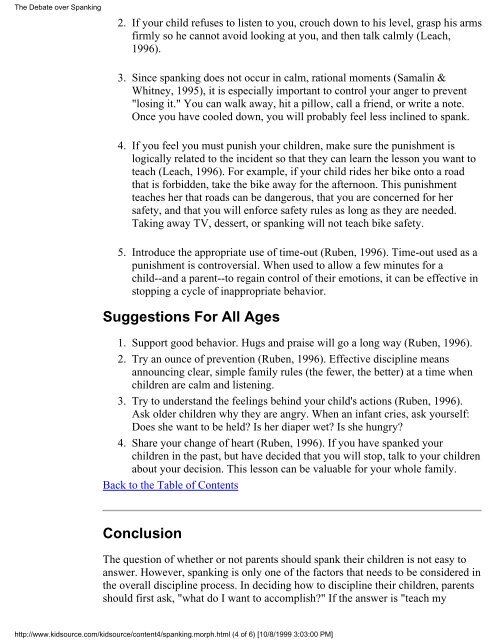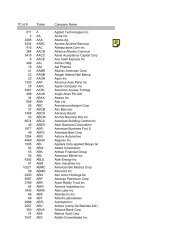spanking - Unauthorized web page
spanking - Unauthorized web page
spanking - Unauthorized web page
Create successful ePaper yourself
Turn your PDF publications into a flip-book with our unique Google optimized e-Paper software.
The Debate over Spanking<br />
2.<br />
3.<br />
4.<br />
5.<br />
If your child refuses to listen to you, crouch down to his level, grasp his arms<br />
firmly so he cannot avoid looking at you, and then talk calmly (Leach,<br />
1996).<br />
Since <strong>spanking</strong> does not occur in calm, rational moments (Samalin &<br />
Whitney, 1995), it is especially important to control your anger to prevent<br />
"losing it." You can walk away, hit a pillow, call a friend, or write a note.<br />
Once you have cooled down, you will probably feel less inclined to spank.<br />
If you feel you must punish your children, make sure the punishment is<br />
logically related to the incident so that they can learn the lesson you want to<br />
teach (Leach, 1996). For example, if your child rides her bike onto a road<br />
that is forbidden, take the bike away for the afternoon. This punishment<br />
teaches her that roads can be dangerous, that you are concerned for her<br />
safety, and that you will enforce safety rules as long as they are needed.<br />
Taking away TV, dessert, or <strong>spanking</strong> will not teach bike safety.<br />
Introduce the appropriate use of time-out (Ruben, 1996). Time-out used as a<br />
punishment is controversial. When used to allow a few minutes for a<br />
child--and a parent--to regain control of their emotions, it can be effective in<br />
stopping a cycle of inappropriate behavior.<br />
Suggestions For All Ages<br />
1. Support good behavior. Hugs and praise will go a long way (Ruben, 1996).<br />
2. Try an ounce of prevention (Ruben, 1996). Effective discipline means<br />
announcing clear, simple family rules (the fewer, the better) at a time when<br />
children are calm and listening.<br />
3. Try to understand the feelings behind your child's actions (Ruben, 1996).<br />
Ask older children why they are angry. When an infant cries, ask yourself:<br />
Does she want to be held? Is her diaper wet? Is she hungry?<br />
4. Share your change of heart (Ruben, 1996). If you have spanked your<br />
children in the past, but have decided that you will stop, talk to your children<br />
about your decision. This lesson can be valuable for your whole family.<br />
Back to the Table of Contents<br />
Conclusion<br />
The question of whether or not parents should spank their children is not easy to<br />
answer. However, <strong>spanking</strong> is only one of the factors that needs to be considered in<br />
the overall discipline process. In deciding how to discipline their children, parents<br />
should first ask, "what do I want to accomplish?" If the answer is "teach my<br />
http://www.kidsource.com/kidsource/content4/<strong>spanking</strong>.morph.html (4 of 6) [10/8/1999 3:03:00 PM]






